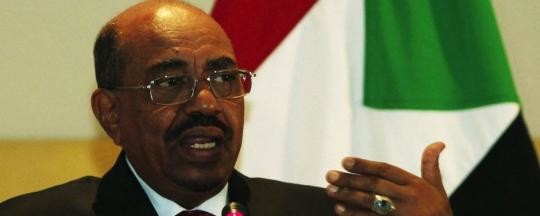Bashir says peace "expanded" in Darfur in 2014

Sudanese President Omar al-Bashir said that peace is spreading in Darfur, despite ongoing hostilities that have displaced half a million people this year.
During an interview in Khartoum with a correspondent from the Washington Post newspaper, Bashir denied accusations that government-allied soldiers had committed atrocities in Darfur.
"Ethnic cleansing, the killing of the people and mass rape, these are all false accusations," he said.
Instead, Bashir claimed that allied militia such as the Rapid Support Forces-a group accused of atrocities-have been "welcomed by the people" for bringing food and medicine.
'Wider and deeper'
He challenged the international community to provide evidence that the RSF has committed any wrongdoing.
"I ask for an independent, impartial committee to come over and track the route of the movement of these forces," Bashir said. "And if this stands to be untrue, we will bear the responsibility.
But the Sudanese president went on to reiterate his desire for the UN Mission in Darfur (UNAMID), which is meant to monitor human rights violations, to withdraw.
"They know that peace in Darfur is getting wider and wider and deeper and deeper," he said.
A recent attempt by UNAMID to carry out an impartial investigation of a recent mass rape of at least 200 women and girls by Sudanese soldiers in the Darfur town of Tabit failed because of the heavy presence of Bashir's security forces in the town.
IDPs would 'rather stay' in camps
Bashir also criticized UNAMID for failing to protect civilians.
"UNAMID has failed to protect even itself, let alone the civilians in Darfur. Just about a week ago, they had a patrol and they had all the arms, including armored vehicles. And they were met by a very small group of rebels and they gave in and fled. And the armored vehicles and the arms were taken away from them," he said.
"Sometimes even a pedestrian with a knife can take their weapons away," he said.
Bashir said the hundreds of thousands of people who have fled their homes this year may have moved not because of war but due to their desire to live in urban centers. He said the IDPs prefer to live in the camps than in their own villages.
"The peaceful area in Darfur has expanded widely in the region," Bashir said. "There is a continuous flow from rural areas into towns, and this is everywhere in Sudan, and there are many reasons for this, and war isn’t necessarily one of them."
"[The IDPs] are provided with food and medical services and everything. To them, it is an easy life. They would rather stay in these camps than go back and work," he claimed.
Protesters 'designated as terrorists'
When asked about the killing of over 200 protesters in Khartoum in September 2013, Bashir claimed only 80 had been killed and said those shot were not peaceful political protesters but violent "terrorists" who attacked police.
He said: "These 80 people were killed through their direct attack on the police stations and the courts. And all police stations across Khartoum were attacked, and they have occupied some of them. And all the courts in Khartoum were attacked. Some of them were burned. hey are aggressive, they are hostile, they kill people they destroy property. They are terrorists. They are designated as terrorists."
Bashir labeled the United States sanctions against Sudan as "unreasonable, unjustified and unjust." He accused the US of not honoring promises to lift sanctions after the Comprehensive Peace Agreement, the Abuja Agreement, and the South's self-determination referendum. He also asserted that America suffers from its own sanctions because Chinese companies have gained access to Sudanese oil.
Bashir has been Sudan's president since he took power in a military coup in 1989. In the interview, he voiced his desire to step down, but said he "succumbs" to pressure to stay.